51. The International AIDS Vaccine Initiative
Newly headed by Margaret McGlynn—the woman who brought the HPV vaccine to market for Merck—IAVI is an incredibly well funded vaccine super house. The AIDS vaccine has long eluded scientists, but as is true with cure research, recent scientific breakthroughs have opened up new avenues and provided rationale for stepping up spending and collaboration. Show us the money, Margie.
52. “In the Life”
A news program that produces change through innovative media that exposes social injustice by chronicling LGBT issues, In the Life is one of the few media outlets in America willing to take on tough and slippery topics like AIDS stigma or the criminalization of people with HIV. We are grateful that they regularly ask us to comment on air. And we appreciate the chance to use a platform with such journalistic integrity to help enlighten the masses.
53. I Stay Healthy
The new iPhone and Android app to help people living with HIV keep track of their lab results is a joint effort between POZ and developer Peter Schmidt. Yes, we’re shamelessly promoting ourselves. But we don’t make any money from the app. We put our name on it because we are in the business of giving out—for free—the essential information and tools for people to stay healthy and thrive.
54. La Toya Jackson
On the last season of Celebrity Apprentice, Jackson chose AIDS Project Los Angeles (APLA) as her charity to carry on the AIDS work of her brother Michael. She may not have won, but in one episode she raised $65,000 for APLA and in doing so won the hearts of many. She continues to raise awareness and dollars for AIDS charities. We’re sure Michael would be very proud.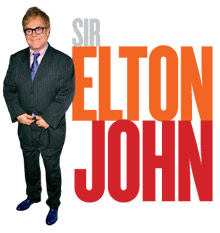 55. Sir Elton John
55. Sir Elton John
Through his eponymous foundation (the Elton John AIDS Foundation) John has used his worldwide fame to help raise more than $225 million for HIV/AIDS. Stars flock to his annual Academy Awards viewing party—this year it brought in $4 million for the cause. We also admire him for making those who get involved accountable. EJAF is suing Spencer Lodge, a Dubai-based banker who allegedly pledged (but never paid) $1 million to the foundation in a charity auction bid. We hope the sun never goes down on John’s advocacy.
56. Sheila Johnson
As the cofounder of Black Entertainment Television, Johnson underwrote the creation of The Other City, an important documentary about the HIV rates in the District of Columbia. A bold move for someone so high up the ladder in corporate America, to be sure. We appreciate her courage and how she leverages her position and talents in the media to make the world open its eyes to the reality of HIV. Looking forward to her next move.
57. Paul Kawata
The effervescent, colorful and fashion-forward Kawata leads the National Minority AIDS Council in its educational and policy work. When not banging on doors on Capitol Hill, he and his staff orchestrate the United States Conference on AIDS. In between those things, he pens his famous “ramblings” or “musings” (sent to the NMAC e-newsletter members), helping us all understand the complexities of AIDS policy and budgets in a fun-to-read way.
58. Michel Kazatchkine
As the executive director of the Global Fund to Fight AIDS, Tuberculosis and Malaria, Kazatchkine manages one of the largest relief funds for AIDS worldwide. It has spent more than $13 billion since 2002, and Kazatchkine has committed to spending about $9 billion more. The Global Fund recently came under fire when an independent panel concluded in January 2011 that the fund needed to reform internal grant management and adopt better financial safeguards. Since then, Kazatchkine has guided the organization through some tricky waters, and it seems like they’re out of the dire straits. This past summer, Germany was back at the table, and other nations were talking about ponying up again.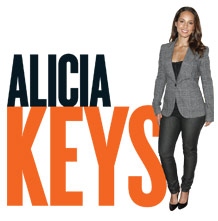 59. Alicia Keys
59. Alicia Keys
Songbird and saver of millions of moms and babies with HIV/AIDS worldwide, Keys worked with Keep a Child Alive to do just that. We love her for using KCA’s annual Black Ball and her celebrity to raise millions, but we really love that when she performed at a private dinner for President Obama in September, she used that opportunity to try to convince him to step up his AIDS game.
60. The Reverend Charles King
Between working stints in still-devastated Haiti and running half-marathons in Costa Rica to raise money for AIDS, King finds time to advocate for the housing needs of Americans with HIV. King’s New York–based Housing Works sets the standard for delivering the services they lobby to fund; notably, in a year of slashed budgets, King was instrumental in securing $8.8 million in federal dollars to improve housing and services for families and people living with HIV. Oh yeah, and he’s not afraid to interrupt the president or dress like a bagel and get arrested by the NYPD.
61. Mark King
Longtime HIV/AIDS advocate Mark King uses his video blog “My Fabulous Disease” to poke fun at life with the virus. Starring in and narrating videos of his experiences in and around the AIDS world, he brings humanity to the horror of HIV. His blog posts appear on thebody.com and bilerico.com. We admire his ability to tell his personal story with honesty and grace—and for giving us license to laugh at AIDS.
62. Larry Kramer
When the legendary AIDS activist took his seminal play The Normal Heart to Broadway for the first time since it debuted in 1985, the crowds—and critics—loved it. Cut to Kramer collecting his Tony for “best revival” in June. Proof positive that 30 years later, AIDS is every bit the great unchecked tragedy Kramer suggested it was, and would become. His courage continues to move us.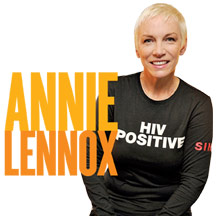 63. Annie Lennox
63. Annie Lennox
As one of UNICEF’s global AIDS ambassadors, Lennox gives generously of her time and voice. Where some celebs merely lend their name, or simply show up for the red carpet, Lennox gets personally involved. She travels around the world to meet with people of influence to garner political and financial capital for the fight. Our fave Lennox moment? Every one when she walks around in that T-shirt that says “HIV Positive” in public, brandishing stigma with each step she takes.
64. Life Ball
Each May in Vienna, Gerry Kessler hosts one of the world’s greatest fund-raising parties to fight AIDS. Think Mardi Gras meets the Halloween parade in Greenwich Village meets Carnival in Rio meets Octoberfest. A star-studded gala dinner precedes a spectacle in Vienna’s main square with Grammy-winning talent and a fashion show. Then 5,000 or so head into Vienna’s City Hall and dance until daylight to save the world from AIDS. Get your tickets now.
65. Jack Mackenroth
Has anyone ever seen Jack entirely clothed? Not that we want to. Now, you can indulge in 15 yummy images of classic Jack and help fight AIDS by purchasing his 2012 Calendar for a Cure. Proceeds from the sales go to amfAR. Jack’s salty tweets make him a big hit on Twitter. Anyone who follows @jackmackenroth knows the power of addiction. Just as when he sheds his second skin, we can’t tear our eyes away from his posts.
66. Jordan M.
It’s kind of amazing that someone so small and so young can have such a huge impact. Jordan was born with HIV and fetal alcohol syndrome. But that hasn’t held him back a bit. He’s a superstar fund-raiser for AIDS, doing whatever it takes (like planting a field of pink flamingos on a neighbor’s lawn) to draw attention and funds to AIDS. Though he is positive, he knows his is the generation that could grow up HIV-free…and he’s doing much to ensure that happens.
67. The Moore Clinic
Led by Richard Moore, MD, and John Bartlett, MD, this clinic, at Johns Hopkins University in Baltimore, recently reported that a whopping 94 percent of the HIV-positive people they treat remain in care. This is huge news, given that high failure rates have been considered commonplace among the urban poor living with HIV. The Hopkins study shows that it is possible to get people retained in care and on antiretroviral therapy, which helps maintain undetectable viral loads—no matter the demographics. Many clinics in urban centers have a lot to learn from the Moore Clinic.
68. David Ernesto Munar
Munar rose through the ranks of the AIDS Foundation of Chicago to be CEO. Living with HIV since 1994, Munar uses his positive status as motivation to help others, especially Latinos and other communities disproportionately impacted by HIV/AIDS. With deep ties in DC, Munar pushed to make HIV a priority of health care reform, and he continues to address the needs of three, key underserved populations: African Americans, Latinos and gay men. Did we mention he also regularly runs 26.2 mile marathons to raise money to end AIDS?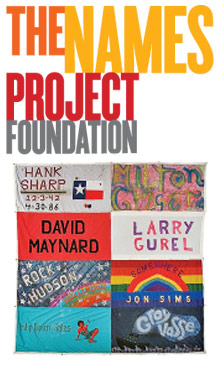 69. The NAMES Project Foundation
69. The NAMES Project Foundation
Founded in 1987, The AIDS Memorial Quilt is one of the largest pieces of tributary art in the world. It’s made from 54 tons of material, from afghans to Barbie dolls, Bubble Wrap to champagne glasses, condoms to corsets, Legos to wedding rings, fishnets to first-place ribbons. The 1,293,000 square feet of this wondrous memorial has drawn more than 18 million visitors and raised more than $4 million for direct services for people with AIDS. It’s a tear-jerking testament to all who have been lost to HIV—and a tangible reminder of what happens if we fail to stop AIDS. Julie Rhoad, executive director of the NAMES Project, has great plans for placing the Quilt in DC to coincide with the International AIDS Conference next summer. Did someone say “AIDS rally”? (POZ editor-in-chief Regan Hofmann is on the NAMES board.)
70. The National Black Clergy for the Elimination of HIV/AIDS Act of 2009
The bill is a comprehensive plan for fighting HIV/AIDS in the black community. It requires that grants go to public health agencies and faith-based organizations to do HIV testing and prevention. Proposed as H.R. 1964 by Representative Charles Rangel (D–N.Y.) and in 2011 as S. 3011 by Senator Kirsten Gillibrand (D–N.Y.), it also mandates a national media outreach program for HIV/AIDS and calls upon the president to declare HIV/AIDS an epidemic in the black community. High time for that.
71. President Barack Obama
As the U.S. senator from Illinois, Obama went after then-South African health minister Tshabalala-Msimang for being an AIDS denialist. Obama got tested publicly for HIV when visiting Kenya, and he made the development of a National HIV/AIDS Strategy a campaign promise that he later kept. As POTUS, he put his pen to the re-authorization of the Ryan White CARE Act in 2009, authorized syringe exchange, lifted the HIV travel ban, sourced emergency funding for ADAP three times in 2010 and 2011 and led the charge on health care reform that ushered the Affordable Patient Care Act to life. The health of many people with HIV hinges on his re-election.
72. Over-the-Counter Tests
One-in-five Americans living with HIV don’t know they have it. This may change with the help of new, rapid, oral swab HIV tests you may soon be able to buy in a drugstore or online. Though the first one (made by OraSure) has yet to be FDA-approved, it’s on track. The best part is that it will likely be supported by a professionally staffed, 24/7, toll-free hotline. Such a hotline would be a great device for delivering much-needed HIV/AIDS counseling, whether a test result is positive or negative.
73. Michael Petrelis
Once called a “tiny terrorist” by POZ, San Francisco–based Petrelis is a significant voice on important issues affecting our community. As a gay man living with HIV, he and his activism go back decades for both LGBT and HIV/AIDS causes. In his blog “The Petrelis Files,” he calls out the powers that be and takes them to task like few others do. Lucikly, he remains relentless.
74. Jim Pickett
As chair of the International Rectal Microbicide Advocates (IRMA), Pickett is known for his frank advocacy about the need for rectal microbicides. His willingness to publicly discuss a much-needed prevention tool drives IRMA’s desire to shape a unified research agenda across the globe. Pickett manages the daily conversations on IRMA’s listserv (more than 1,000 members) from his office at the AIDS Foundation of Chicago (AFC), where he is director of advocacy (IRMA is a project of AFC). The list is inevitably host to fascinating, pivotal discussions.
75. Positive Justice Project
In response to widespread HIV criminalization, the Center for HIV Law and Policy (CHLP) launched the Positive Justice Project (PJP). The CHLP is a NYC-based national resource that works to secure the rights of people affected by HIV. It created PJP to bring an end to criminal HIV laws. Kudos to CHLP executive director Catherine Hanssens, PJP senior advisor Sean Strub (founder of POZ) and all the other members of the PJP working consortium for setting the record straight.
Introduction | 1-25 | 26-50 | 51-75 | 76-100





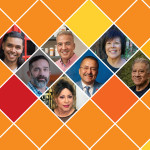
Comments
Comments